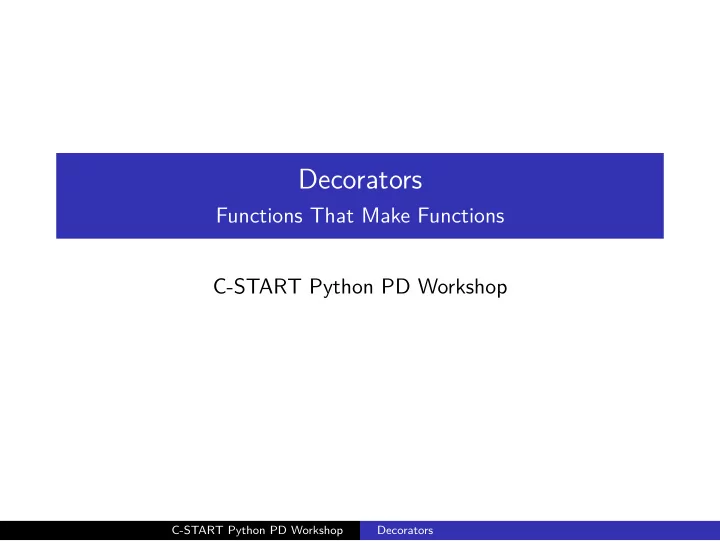

Decorators Functions That Make Functions C-START Python PD Workshop C-START Python PD Workshop Decorators
Functions Functions are fjrst-class citizens in Python: >>> def identity(x): ... return x ... <class 'function'> Functions can also be written anonymously as lambda s: >>> identity = lambda x:x >>> identity(42) 42 In this case, the fjrst style is preferred. It’s a bit easier to read, not to mention it’s actually named. C-START Python PD Workshop Decorators >>> type(identity)
Functions Functions are fjrst-class citizens in Python: >>> def identity(x): ... return x ... <class 'function'> Functions can also be written anonymously as lambda s: >>> identity = lambda x:x >>> identity(42) 42 In this case, the fjrst style is preferred. It’s a bit easier to read, not to mention it’s actually named. C-START Python PD Workshop Decorators >>> type(identity)
Functions Functions are fjrst-class citizens in Python: >>> def identity(x): ... return x ... <class 'function'> Functions can also be written anonymously as lambda s: >>> identity = lambda x:x >>> identity(42) 42 In this case, the fjrst style is preferred. It’s a bit easier to read, not to mention it’s actually named. C-START Python PD Workshop Decorators >>> type(identity)
*args , **kwargs Python allows you to defjne functions that take a variable number of positional ( *args ) or keyword ( **kwargs ) arguments. In principle, this really just works like tuple expansion/collection. def crazyprinter(*args, **kwargs): for arg in args: print(arg) for k, v in kwargs.items(): print(" {} = {} ".format(k, v)) crazyprinter("hello", "cheese", bar="foo") # hello # cheese # bar=foo C-START Python PD Workshop Decorators
*args , **kwargs Python allows you to defjne functions that take a variable number of positional ( *args ) or keyword ( **kwargs ) arguments. In principle, this really just works like tuple expansion/collection. def crazyprinter(*args, **kwargs): for arg in args: print(arg) for k, v in kwargs.items(): print(" {} = {} ".format(k, v)) crazyprinter("hello", "cheese", bar="foo") # hello # cheese # bar=foo C-START Python PD Workshop Decorators
Decorators @property as we just saw is what is called a decorator. Decorators are really just a pretty way to wrap functions using functions that return functions. Both the following are equivalent: @logging def foo(bar, baz): return bar + baz - 42 # equivalent to... def foo(bar, baz): return bar + baz - 42 foo = logging(foo) C-START Python PD Workshop Decorators
Decorators @property as we just saw is what is called a decorator. Decorators are really just a pretty way to wrap functions using functions that return functions. Both the following are equivalent: @logging def foo(bar, baz): return bar + baz - 42 # equivalent to... def foo(bar, baz): return bar + baz - 42 foo = logging(foo) C-START Python PD Workshop Decorators
Defjning Decorators When defjning wrapper functions, you should decorate it with wraps from functools , this will keep attributes about the function. from functools import wraps def logging(func): @wraps(func) def wrapper(*args, **kwargs): print(result) return result return wrapper C-START Python PD Workshop Decorators result = func(*args, **kwargs)
Decorators in the Wild: Dynamic Programming lru_cache from functools can be a quick way to make a recursive function with a recurrence relation fast. Here’s an example: from functools import lru_cache @lru_cache(maxsize= None ) def fibonacci(n): if n == 0 or n == 1: return n return fibonacci(n - 1) + fibonacci(n - 2) C-START Python PD Workshop Decorators
Decorators in the Wild: Dynamic Programming lru_cache from functools can be a quick way to make a recursive function with a recurrence relation fast. Here’s an example: from functools import lru_cache @lru_cache(maxsize= None ) def fibonacci(n): if n == 0 or n == 1: return n return fibonacci(n - 1) + fibonacci(n - 2) C-START Python PD Workshop Decorators
def diceroll(u): Decorators in the Wild: Welford’s Equations Welford’s Equations are a one-pass mean and standard deviation algorithm. One important property is that we won’t have to store the results in a list. Our goal will be to implement a decorator we can use like this: @Welford return int(u * 6) + 1 # call diceroll with some u's in (0, 1) print(diceroll.mean, diceroll.stdev) C-START Python PD Workshop Decorators
Decorators in the Wild: Welford’s Equations Welford’s Equations are a one-pass mean and standard deviation algorithm. One important property is that we won’t have to store the results in a list. Our goal will be to implement a decorator we can use like this: @Welford return int(u * 6) + 1 # call diceroll with some u's in (0, 1) print(diceroll.mean, diceroll.stdev) C-START Python PD Workshop Decorators def diceroll(u):
Decorators in the Wild: Implementing Welford The key here is that we can make callable objects using __call__ . C-START Python PD Workshop return sqrt(self.v/self.trials) if self.trials else 0 @property return r self.mean += d/self.trials self.v += d**2 * (self.trials - 1)/self.trials d = r - self.mean self.trials += 1 def __call__(self, *args, **kwargs): self.trials = 0 self.v = 0 self.mean = 0 update_wrapper(self, f) self.f = f def __init__(self, f): class Welford: from math import sqrt from functools import update_wrapper Decorators r = self.f(*args, **kwargs) def stdev(self):
More Decorator Tricks Decorators can wrap classes as well as functions. A practical example might be creating a decorator which adds attributes of a class to a database (a @model decorator?) When multiple decorators are typed, they are applied bottom-up. C-START Python PD Workshop Decorators
More Decorator Tricks Decorators can wrap classes as well as functions. A practical example might be creating a decorator which adds attributes of a class to a database (a @model decorator?) When multiple decorators are typed, they are applied bottom-up. C-START Python PD Workshop Decorators
Recommend
More recommend